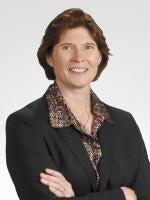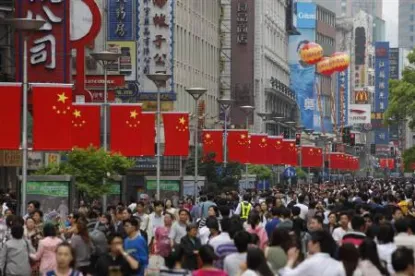When the Delegation arrived for the start of the 6th Wuhan Service Outsourcing Industry Development and Cooperation International Forum this morning, each of us found a beautiful purple orchid boutonniere at our seat. In addition to this, we received a bottle of “mineralized” drinking water, Ice Dew. Ice Dew is one of the leading brands of bottled water in China and is a Coca-Cola product. In fact, in 2010, Coca-Cola China launched an eco-friendly, light weight bottle for Ice Dew. The design and texture of this bottle is very different from the DASANI® bottle in the US, as the Ice Dew bottle is more decorative than the DASANI® bottle.
A number of local government officials and business leaders from Wuhan participated in today’s program. Similar to Suzhou, the stage set for the presentations contained a large multimedia screen and was surrounded with a variety of green plants with a few marigold plants. In Wednesday’s blog, I described how the podium in Suzhou was ornamented with a dozen red roses. The podium used in today’s meeting featured a beautiful spray of mixed flowers.
For several hours, the meeting focused on the service outsourcing industry in Wuhan. According to government officials, Wuhan’s 2011 service outsourcing industry achieved an operating income of 40.7 billion RMB, an increase of 44.8% over 2010. Wuhan’s Off-Shore Outsourcing industry achieved an operating income of 254 million RMB in 2011, an increase over 2010 of 97.7%. Wuhan hopes to increase its outsourcing revenue to 120 billion RMB annually by 2015. The city’s plan to achieve this lofty goal involves (1) developing software outsourcing service enterprises; (2) developing financial service outsourcing enterprises; (3) developing digital entertainment enterprises; and (4) building fully functional state-of-the-art facilities in the service outsourcing bearing area.
Similar to Suzhou, Wuhan has invested in creating a world-class higher educational system. Specifically, Wuhan has built 84 colleges and universities with a current enrollment of 1.2 million students. Each year, these colleges and universities graduate 300,000 students, thereby providing a large pool of talent available for employment in the above enterprises.
A very interesting presentation was given by Siegmar Haasis, President & CIO IT of Daimler North East Asia Pte Ltd. (Daimler) regarding business cooperation opportunities between world-class companies and new emerging service providers in China. Mr. Haasis was appointed President & CIO IT in October 2012 and is headquartered in Beijing. If the name “Daimler” does not ring a bell, think of Mercedes-Benz cars, Daimler Trucks, Mercedes-Benz vans, Daimler Buses and Daimler Financial Services (financing and leasing). Mercedes-Benz cars are by far Daimler’s biggest product, resulting in annual sales of 57.4 billion Euros while employing 99,091 people worldwide. Next closest is Daimler Trucks which has annual sales of 28.8 billion Euros and employs 77,295 people worldwide. This is followed by Mercedes-Benz vans which has annual sales of 9.2 billion Euros and employs 14,889 people worldwide, Daimler Financial Services which has annual revenues of about 12.1 billion Euros and employs about 7,065 people and Daimler buses which has annual sales of 4.4 billion Euros and employs 17,495 people worldwide.
In total, Daimler currently employs 271,370 people worldwide, of which, the largest number, 201,354, are in Europe and 18,153 in Asia. Mr. Haasis expects Asia to ultimately contain the highest number of Daimler employees in the world. In fact, he stated that due to the rapid growth in China, he intends to double his work force every year for the next few years.
Moreover, according to Mr. Haasis, by the end of 2012 or early 2013, China will be the #1 market for Daimler in car, truck, and van sales. He indicated that an announcement will be made shortly that in January 2013, a new Daimler car will be made available in China that will be produced entirely in China for the Chinese market.
During his presentation, Mr. Haasis stated that “China will not only be a source of significant business growth for the big companies but it will also be a key source of talent, innovation and ground-breaking approaches to business. World-class companies are looking forward to this opportunity to leverage this benefit.” In his opinion, he believes that world-class companies look for the following when determining whether to enter into a business cooperation opportunity in China: (1) non-core business operations; (2) access to world-class technology; (3) reduction in operating cost; (4) access to exceptional skills and capabilities; and (5) effective business management. Daimler is looking for “…a long term reliable, ethical and knowledgeable service provider who can provide comparable services with comparable quality at comparable price.”
Another very interesting presentation was given by Mr. Chen Yulong, a member of the Advisory Committee for State Informationization and Researcher for SIC. Mr. Yulong noted that service outsourcing has been around for centuries. In his view, the key question is whether service outsourcing can transform and evolve, particularly in the current economic climate. In his opinion, the key to transforming service outsourcing is new technology. Mr. Yulong believes that service outsourcing companies should focus on newly emerging technologies, such as the Internet of Things, which refers to uniquely identifiable objects and their virtual representations in an Internet-like structure as an example, to achieve such transformation and evolution.
Mr. Yulong also discussed the industrial revolutions that have occurred throughout history. He noted that it is well accepted that human civilization has been through two major industrial revolutions: (1) the agricultural revolution, which was driven by the upgrading and advancement of agricultural tools; and (2) the industrial revolution, which occurred during the period from 1750 to 1850. Mr. Yulong argues that a third industrial revolution occurred in the 1950’s. According to Mr. Yulong, the 1950’s was a time during which information technology gained rapid development. He believes that currently, we are in another industrial revolution, namely the “modern economy” revolution. Mr. Yulong believes that service outsourcing will play a crucial role in the development of this modern economic revolution. Going forward, he believes that service outsourcing should develop as a combination of informationization and industrialization.
As a quick side note, several times this week I have written about the impressive colleges and universities that the Delegation has visited. Given the high cost of tuition at U.S.colleges and universities, I spent some time today inquiring about the cost of higher education here in China. I was able to learn that it depends on the course of study selected by the student. Tuition ranges from about $1,600 – $3,200 per year, per student. Additionally, there are a variety of scholarship programs available for students who may not be able to afford the tuition.
Delegate Spotlight: Martin Bloom, Emblem Ventures, London, UK.
Martin has had one of the most unique, colorful and diverse careers of any person I have met. He is a very unique businessman in that he builds businesses, directly and indirectly, using a combination of business acumen and artistic vision, and is able to express himself through artistic pursuits. Martin has used his unique talents to build scalable high growth businesses internationally in the U.S., Europe, and China. In fact, he now spends a quarter of his time in China and sees the region as critical to the high growth prospects of Western companies.
Martin is the CEO of Emblem Ventures. He was with Unilever for almost a decade in his early career and also worked at Chatham House. While at Chatham House, he wrote a book on the industrialization of South Korea, which was published by the Organisation for Economic Co-operation and Development (OECD), and was actively involved with high-tech forums between the British government and Japan. The purpose of these programs was to bring together the top R&D directors in Japan with their British counterparts once a year. He then ran a technology transfer program for the British government assisting British companies to develop strategic relationships with Japanese companies.
Since 1997, Martin has been actively building businesses through a combination of mentoring entrepreneurs in the UK, U.S. and China, investing in international high growth companies, and joining company boards to design and drive forward unique business models and raise financing for these companies. Martin’s skill is in deconstructing business models to make them scalable.
In 2001, he started his first venture collaboration with China and in 2005 was appointed UK Chairman of the China-UK Venture Capital Joint Working Group. This working group had such high support that the first meeting was launched by then Finance Minister Gordon Brown, in Beijing. Martin went on as Chairman to assist Chinese solar wafer manufacturer Renesola list first on the London Stock Exchange (AIM) and then on the New York Stock Exchange (NYSE: SOL). Annual revenues grew from $5 million to $1.2 billion in five years. He has just joined the Board of a British fuel cell company which has high growth potential.
Business creation and building is just one outlet for Martin’s creativity. He is an excellent photographer and has created stunning works of art. In fact, in 2007, his work was displayed at Factory 798, an art gallery in Beijing. The exhibition was entitled “Images of China in Transition.” In addition, he had an exhibition in the gallery of the Lee Miller Archive. The photographs were taken in the garden of Lee Miller in Sussex, England and were exhibited alongside his selection of some of her unseen images. Additionally, Martin produced the catalogue for the Tunnel 228 Underground Installation produced by Kevin Spacey and The Old Vic, where Kevin Spacey works as Director. According to Mr. Spacey, “Martin has the rare ability for a photographer to capture the essence of a subject and turn them into works of art which speak to us directly.”
Furthermore, Martin is currently working on the first of a three-volume novel entitled “The Gift”. The first volume ends with the day before 9/11 and our hero is a young woman trying to get back home to Ithaca, NY to her ill mother. It is an Odyssey and as such, she offends the Gods and is blown off course. Martin is writing the book to express the feelings he had during the first internet era; he spent a third of his time in the US between 1998-2002, investing in e-commerce and telecom companies in California, New York, Boston and Northern Virginia. Martin has embedded some of his photographs and poetry into the book and these will also be published as a separate volume.
Read the rest of this series:
Opening of the 13th Great-Idea China Sourcing & New Industrial Delegation to China
13th Great-Idea China Sourcing & New Industrial Delegation to China – Day 2
13th Great-Idea China Sourcing & New Industrial Delegation to China – Day 4
13th Great-Idea China Sourcing & New Industrial Delegation to China – Day 6
13th Great-Idea China Sourcing & New Industrial Delegation to China – Day 7
13th Great-Idea China Sourcing & New Industrial Delegation to China – Day 8




 />i
/>i

